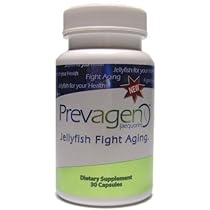That which makes jellyfish glow in the deep...
may save your aging brain. And who better than an aging internist to take a keen interest in getting all body parts to the finish line intact? I paid particular attention then when I came across this new concept in neuroprotection.
Calcium is as we know a good thing. In particular it holds up our joints and activates our nerves. When neurons are stimulated by a passing impulse via a transmitting molecule called glutamate they open up their pores and let the calcium trickle in. Not pour in mind you just trickle. If they get over-goosed with glutamate a situation called excitoxicity too much calcium enters the neuron which upsets it unto death.
Enter aequorin. Scientists have long called on the jellyfish protein as a 'calcium reporter.' In other words add aequorin to a cell preparation in a laboratory the aequorin hooks up with the calcium and bingo! that which is calcium-laden within the cell lights up like a jellyfish.
Mark Underwood of Quincy Bioscience figured out that giving aequorin to rats through the golden months of their lives helped them hang onto the ability to perform tricks despite their advancing age. Rats normally get less tricky as they age because they lose their calcium-binding proteins which allows free calcium to ravage their brains while their tricks leak out. But rats plus jellyfish protein equals peak performance at mazes and bells throughout their lifespan.
I was pleased to recently hear that Prevagen was now available to humans. I fully expected a product that I would take because it would protect me against losing my marbles on down the road but which would not particularly change my day-to-day functioning. To my surprise not only did Prevagen clear my head of early morning fogs and the urge to nap after lunch by day three a longstanding tremor in my left arm was nearly gone. The only downside I've noted with the use of Prevagen is that it interferes with the soundness of my sleep.More detail ...

0 comments:
Post a Comment